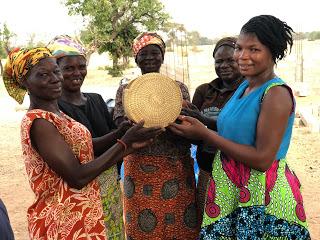ASIGE (Advocacy for Social Inclusion and Girls' Education), is a pioneering social enterprise operating in Ghana and Scotland (UK). ASIGE's model is a blend of fair trade commerce and community development, focusing on the economic empowerment of women and young people while promoting environmental sustainability.
It’s mission is centered on the principle of "Weaving futures, empowering communities," and it operates as a social enterprise selling artisan-crafted goods to achieve its impact goals.
ASIGE’s work is driven by a powerful vision to "build a healthier Earth and break the cycle of poverty" through sustainable enterprise that produces goods with both purpose and impact.
I. The Fair Trade Social Enterprise Model
ASIGE is fundamentally a fair trade organization that generates the income for its social programs through the sale of artisan products.
- Product Focus: The enterprise produces high-quality, eco-friendly, handmade goods—primarily bags, Bolga baskets, and homewares—using locally sourced natural materials like elephant grass and millet leaves. These products serve as a sustainable alternative to single-use plastics.
- Artisan Empowerment: The items are handwoven by a network that has grown from 30 women to over 450 women and young people across six communities in Ghana's Upper East Region.
- Ethical Commitment: ASIGE is a guaranteed member of the World Fair Trade Organization (WFTO), which verifies its adherence to strict principles of fair pay, ethical working conditions, and transparency. This ensures the artisans receive fair wages and are the primary beneficiaries of the sales, upholding human dignity over mass production.
II. Core Values and Guiding Principles
ASIGE's operations are guided by a set of core values woven into every aspect of its work:
III. Social Impact and Community Programs
The proceeds from the social enterprise are strategically reinvested into six critical community-based programs that address the root causes of poverty and inequality:
- Basketry Development Programme: Sustains and develops the artisans' weaving skills, ensuring a reliable income stream and preserving cultural heritage.
- Vocational Skills Training: Provides training in skills beyond weaving—such as tailoring, shea butter production, and sustainable agriculture (like cashew cultivation)—for young people, teenage mothers, and school dropouts, diversifying their economic independence.
- Reproductive Health Education: Provides crucial information to thousands of adolescents to address high rates of teenage pregnancy and health issues, contributing to the community's overall well-being.
- Reusable Sanitary Pads: Produces and distributes reusable sanitary products to girls, an intervention that directly combats period poverty and helps girls stay in school.
- Girls Education Scholarship Programme: Offers scholarships for girls from rural communities to pursue university education, breaking systemic barriers to gender equality and future leadership.
- Microfinance and Financial Literacy: Provides women with financial literacy training and access to a microfinance fund, giving them the resources and knowledge to build their own businesses and save for the future.
IV. Quantifiable Impact
ASIGE’s integrated approach has delivered measurable results since its founding in 2017:
- The network of artisans has grown to include over 450 women and young people.
- The organization has provided reproductive health education to over 10,000 adolescents.
- Over 8,800 reusable sanitary pads have been produced and distributed.
- Vocational skills training has been delivered to over 100 young people.
- They have established a permanent Women's Weaving Center in the Bolgatanga district, providing a year-round, safe shelter for hundreds of skilled artisans.
ASIGE exemplifies how ethical commerce can be a powerful engine for social change, allowing consumers to make an investment in a durable product that simultaneously funds vital community development, education, and health initiatives in Ghana.
